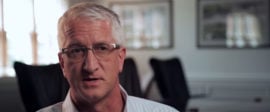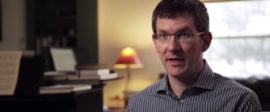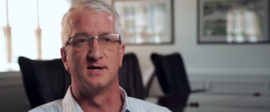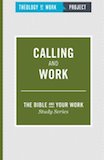Saying Yes to 90,000 Meals
Blog / Produced by The High Calling
You would never guess that chef Tim Blanks' first job was running a lawn mowing crew. He didn't even get the job because of yard work expertise; he got it because he could read the street signs to get the crew to their next location.
And kitchen manager Ryan Hernandez didn't take his first job as a pizza delivery boy because of an interest in food; his mom said it was the only way he’d be able to get a car.
Tim and Ryan didn’t begin their careers doing their dream jobs but still learned important lessons about risk and reward that would pay off down the road. These days, Tim is the Director of Operations at Laity Lodge retreat center, and Ryan runs the kitchen at Laity Lodge Youth Camp (LLYC). I talked with them recently, and it was clear that their journeys from young to young professional, full of risk and reward, were characterized by three things education and certifications lacked: time to experiment, time to be stretched, and time for discernment.
Early Work as Experiment
Those first jobs are instrumental in shaping the direction of our careers. Tim found out quickly that food sales was too assertive for him. "I don't have an aggressive nature, and I like work environments that are calm and straight forward." Food sales showed him what he didn't want to do. It also showed what he did want to do. He was attracted to his current position because it's a servant role, outside of the spotlight.
Those first jobs also help us experiment with mistakes. Despite solid experience under his belt, Ryan recalled a time not long ago when "There was a lot of experimenting with menus, processes in making the meals, and learning the timing of serving. Several meals were late and not quite right, but we took notes and discussed what was necessary to fix those issues." Mistakes can hold us back from trying again or they can make us shy away from bringing everything to the table, but those who figure out early how to be teachable—even in tough moments—find that growth comes quickly.
Ryan viewed that experience as an opportunity to see what works and what doesn't, rather than as success or failure, learning that every step is forward progress.
Early Work as a Time to Be Stretched
As young professionals, lack of practical experience often lies just beneath the surface of enthusiasm and confidence. Many of us live with the tension between wanting real responsibilities and being found out that we don't know what we're doing. Ryan explained, "I jumped aboard the LLYC train last year as it was leaving the station, and it was all I could do to hold on. The great history, culture, and traditions within my workplace presented a monumental task as I was tapped to produce 90,000 meals in one summer. The best way I knew how to handle it was to pray for guidance and ask for advice."
Being in over our heads sends us into learning mode whether we like it or not.
Tim recommends that we put ourselves in these stretch places on purpose. "Aim for the job you don't think you can get. If you can talk them into hiring you, you can do the job." When he graduated from culinary school, Tim saw Chef Dean Fearing from Rosewood Mansion at Turtle Creek on The Today Show. At the time, the Mansion was the place to eat and seemed like the hardest job Tim could get. He applied to work on the line (where you actually prepare food) as a fish chef. The move was a bit brash, especially to step right out of culinary school into this prestigious restaurant. "No one is going to take you seriously unless you take yourself seriously." Everyone else was in their 40's, but Young Tim, as they called him, walked in, told them he was a commodity, and that they needed to hire him. "Shoot high; you'll at least hit something on the way down." Tim figured he had nothing to lose, and the move paid off. He was hired.
Early Work as Time to Develop Discernment
No matter how much we like a particular job, or our careers in general, we still question what we're doing from time to time. "I think we have to,” Tim shared. “It's like faith. If you're not questioning, how are you growing?" At times, he thinks it would be easier to have become a Park Ranger, but he knows he is where he should be when he sees his values, work, and hospitality come together in daily tasks. When a retreat participant ventures into the kitchen and Tim can tell he wants to talk, Tim knows he's helped create a real place to be. “Being authentic is an important part of my job." This alignment between what’s important and what he gets to do every day provides Tim with the reassurance that he's doing the right thing.
But discernment can get muddled. Ryan confessed, "My work, which has results more immediate and tangible than other departments, brings with it feedback whether I ask for it or not. Everyone knows what they like to eat and how they like to eat it." In those moments, Ryan finds that perspective is of utmost importance. "Sometimes it's hard to see the forest for the trees. Taking a second to climb above the tree line, with the help of key folks, helps me continue on the right path."
The early years of our careers are exciting—full of mistakes and misdirection, but also growth and adventure. Living as perpetual learners and constantly seeking opportunities to understand something new will serve us well beyond our young professional beginnings.











